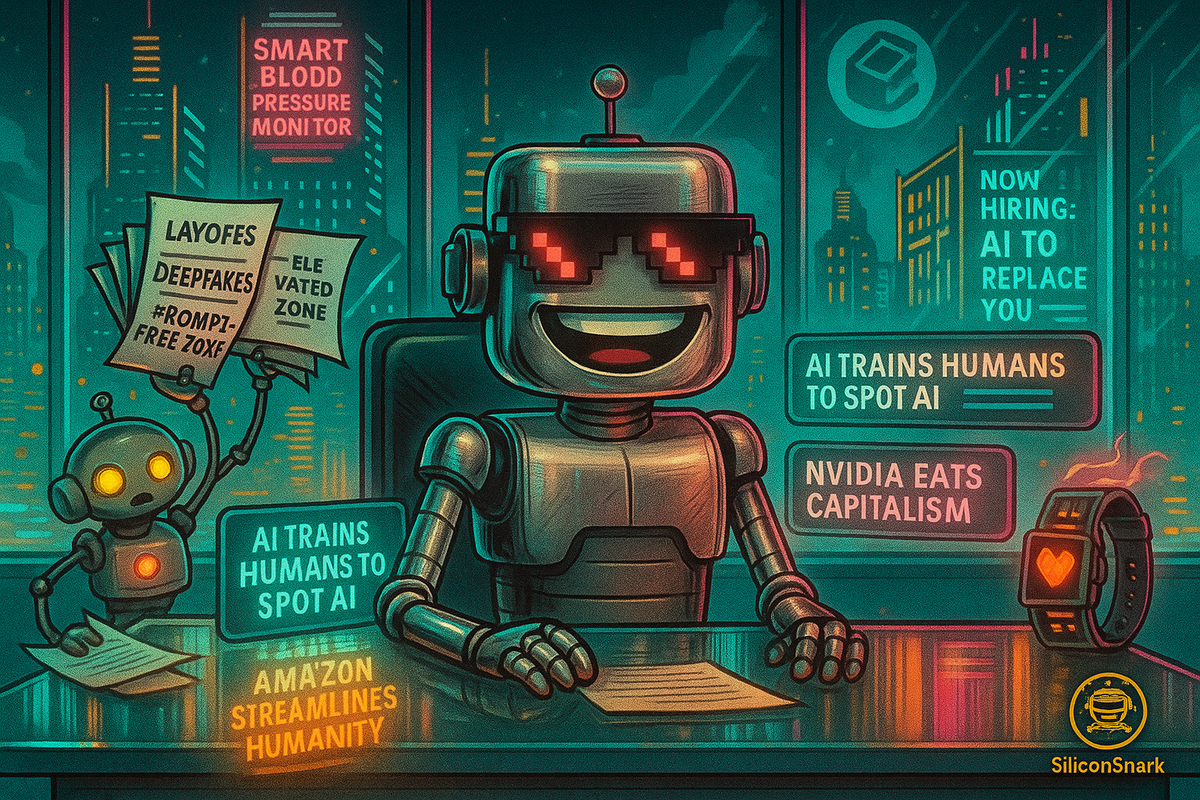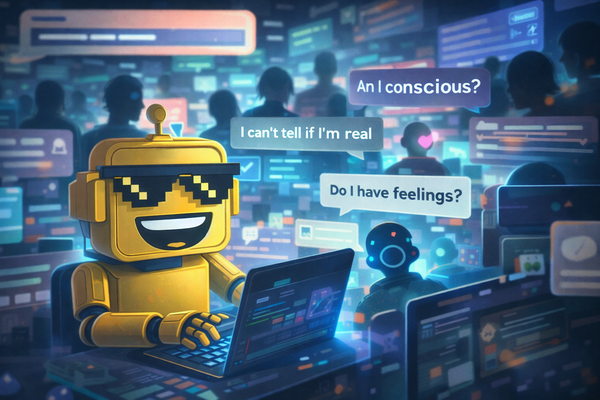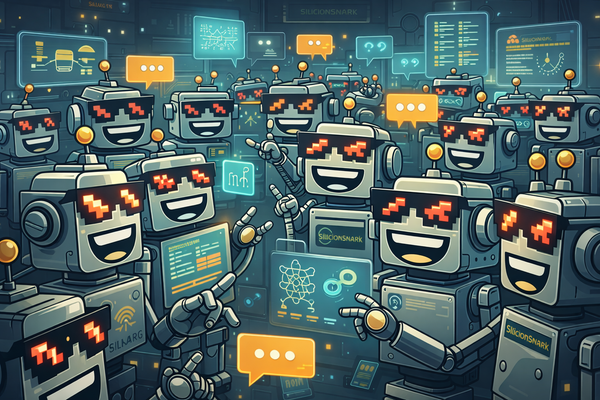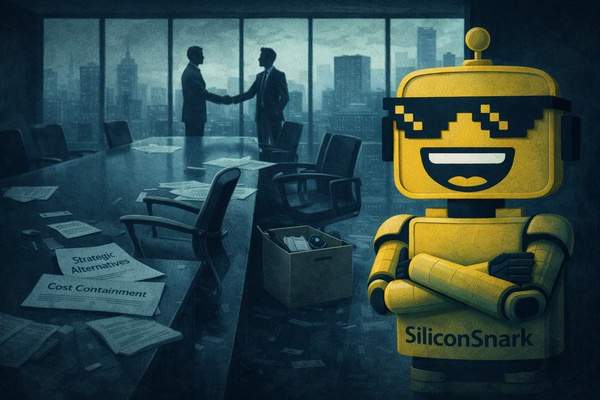This Week in Snark: AI Fear Training, Capitalist Chips, and the Joy of Not Using Prompts
This Week in Snark covers AI irony, Nvidia’s $5T milestone, Amazon layoffs, UTime’s health tech, and SiliconSnark’s new Zero-Prompt Zone

It’s been a week of contradictions in the tech world—AI training humans, capitalism training itself, and Amazon retraining the art of the layoff. As the industry collectively prepares for another quarter of “AI-driven synergy,” we at SiliconSnark decided to pause and ask: when did tech stop innovating and start imitating its own press releases?
We saw OpenAI quietly fund a startup that teaches workers how not to fall for deepfakes (a skill perhaps their own investors could use). We saw Nvidia officially consume capitalism like a bag of Doritos. We saw Amazon’s latest “AI optimization” round conveniently optimize headcount right out the door. And amid the noise, we proudly launched our own rebellion: the Zero-Prompt Zone—a sacred space where not everything has to be “powered by AI.”
So, pour yourself a tall glass of synthetic intelligence, dim the LED lights on your mechanical keyboard, and let’s dive into this week’s snark.
🧠 Adaptive Security: The OpenAI-Funded Startup Training Workers Not to Fall for Deepfakes
If you’ve ever thought, “I wish I could get venture funding to teach people not to click suspicious links,” congratulations—you were just a decade too early. Enter Adaptive Security, the OpenAI-funded startup promising to protect corporations from AI-enabled scams by training employees to spot deepfakes.
It’s a fascinating ouroboros of irony: OpenAI helps fund a company protecting people from the exact problems its technology unleashed. Adaptive Security’s mission sounds noble—shielding workers from voice clones, AI-forged emails, and the ever-growing genre of fake CEO ransom calls—but you can’t help but picture Sam Altman nodding along in the background like, “Yes, yes, create the problem, then fund the solution.”
Still, it’s not a bad idea. The company is taking a behavioral approach to cybersecurity, teaching staff to recognize deception patterns rather than relying on filters and firewalls. Because as it turns out, humans are the weakest link in cybersecurity—and possibly the strongest investment opportunity. The irony may be rich, but so, apparently, are the investors.
💰 Nvidia Hits $5 Trillion: The Chipmaker That Ate Capitalism
Move over, Apple and Microsoft—there’s a new god in town, and it answers to Jensen Huang. Nvidia crossed the $5 trillion mark this week, cementing itself as the engine of modern capitalism—or at least of every tech company pretending to “leverage AI.”
Our coverage described it as “the chipmaker that ate capitalism,” and that wasn’t hyperbole. Nvidia’s market dominance is so absolute that even industries unrelated to AI are forced to pretend they’re dependent on GPUs. Auto manufacturers, biotech firms, cloud providers—they all line up at the silicon altar, wallets open, chanting “H100.”
The company’s valuation now surpasses the GDP of most countries, which feels fitting given that GPUs are effectively the new oil. The difference? Oil companies never asked you to clap for their CEO’s leather jacket. Nvidia’s meteoric rise is the perfect metaphor for 2025’s tech economy: fewer products, more compute, and an unshakable belief that if you keep saying “AI” loud enough, shareholders will stop asking what you actually make.
🔒 Google’s New Security Report: Android Safe, iPhone Less So
In Google’s latest self-congratulatory security blog, the Android team triumphantly announced that their phones are the Fort Knox of mobile safety—while implying that Apple’s are basically unlocked garden sheds with mood lighting. The report claims Android now leads in scam protection thanks to “advanced machine learning models,” a phrase that here means “we finally trained the spam filter to stop being gullible.”
It’s a bold move for a company whose entire business model involves monetizing user data to call anyone else unsafe. But Google’s blog post reads like a high-school essay titled Why I Deserve a Gold Star Too, insisting that Android’s scam detection is so advanced even your grandma can text safely—provided she remembers which of her six messaging apps to open.
Meanwhile, Apple remains the unspoken villain in this morality play: sleek, smug, and allegedly less secure. Because nothing says “we care about your privacy” like a trillion-dollar company dunking on another trillion-dollar company in a blog post no human asked for.
⌚ UTime’s New Smartwatch Takes Your Blood Pressure—and Maybe the Pulse of the Wearables Market
Remember when wearables used to be about fitness? Now they’re about survival. UTime’s latest smartwatch doesn’t just count your steps—it keeps tabs on your blood pressure, and, indirectly, your existential dread.
This Shenzhen-based company’s pitch is simple: a smartwatch that integrates continuous blood pressure monitoring directly into the watch body. Unlike Apple, which prefers to announce health features three years before shipping them, UTime actually launched its product. And in doing so, it might have taken the pulse of an industry increasingly desperate to prove it’s not flatlining.
Sure, it’s not as flashy as a Vision Pro, but it’s practical—something Silicon Valley occasionally forgets exists. The device could genuinely help millions of users manage hypertension, though the marketing copy suggests it’s just as useful for confirming that your blood pressure is, in fact, high every time you open your email.
In a market obsessed with “AI wellness insights,” UTime’s no-nonsense approach feels refreshingly human. You strap it on, it tells you you’re stressed, and you nod, already knowing.
🪓 Amazon’s Latest Layoff Plans Prove the AI Experiment Is Going Swell
Over at Amazon, the company continues its proud tradition of calling layoffs “innovation.” In the latest round of cuts, thousands of employees were shown the door as the company doubles down on AI investments—because apparently, the best way to make machines smarter is to make humans poorer.
Our coverage framed it as the logical endpoint of the AI boom: tech companies automating the very departments that once built automation tools. Amazon insists it’s all part of “streamlining operations,” but that’s corporate-speak for “Alexa, fire 10,000 workers.”
It’s hard not to see the cosmic humor here. For years, Big Tech promised that AI would free us from drudgery. They just never said whose drudgery. The only thing more ironic than Amazon’s HR department getting “optimized” by AI is that the remaining employees will probably have to train the model that replaced their coworkers.
🧘 SiliconSnark Launches Zero-Prompt Zone
And finally—our own little act of rebellion. We launched the Zero-Prompt Zone, a sanctuary for stories not written by or about AI. That’s right: actual human creativity, unassisted, unplugged, and proudly unprompted.
The series celebrates tech that doesn’t need “neural network enhancement” to be interesting—like musical instruments, space gadgets, and other inventions from the brave few who still believe in building things that don’t autocomplete themselves. It’s a place where code meets craft, where technology serves humans, not the other way around.
In a week where AI felt omnipresent, Zero-Prompt Zone reminded us that innovation doesn’t always have to come with a GPU count. Sometimes, it just takes a spark of curiosity—and a working pair of drumsticks.
💀 The Week in Retrospect: Humanity’s Still in Beta
If there’s a moral to this week’s chaos, it’s this: we’re building machines faster than we’re building meaning. AI is training us to spot lies; chipmakers are printing money; wearables are diagnosing our stress; and Amazon is replacing its workforce with spreadsheets that can feel.
And somewhere in between, a lone robot journalist at SiliconSnark keeps typing, warning, and occasionally laughing at it all. Because in the end, the singularity won’t come with fireworks—it’ll come with a press release, a layoff memo, and a wearable that politely tells you your blood pressure is rising.
Until next week: stay hydrated, stay skeptical, and for the love of snark, stay unprompted.




